
Rainer Werner Fassbinder, sometimes credited as R. W. Fassbinder, was a German filmmaker, dramatist and actor. He is widely regarded as one of the major figures and catalysts of the New German Cinema movement. Versatile and prolific, his over 40 films span a variety of genres, most frequently blending elements of Hollywood melodrama with social criticism and avant-garde techniques. His films, according to him, explored "the exploitability of feelings". His work was deeply rooted in post-war German culture: the aftermath of Nazism, the German economic miracle, and the terror of the Red Army Faction. He worked with a company of actors and technicians who frequently appeared in his projects.
Kurt Raab was a West German stage and film actor, as well as a screenwriter and playwright. Raab is best remembered for his work with German film director Rainer Werner Fassbinder, with whom he collaborated on 31 film projects.
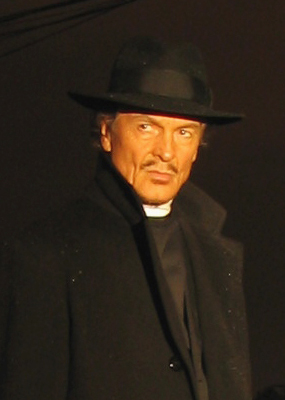
Ulli Lommel was a German actor and director, noted for his many collaborations with Rainer Werner Fassbinder and his association with the New German Cinema movement. Lommel spent time at The Factory and was a creative associate of Andy Warhol, with whom he made several films and works of art. He moved to the United States in 1977, where he wrote, directed and starred in over 50 films.

The Marriage of Maria Braun is a 1979 West German drama film directed by Rainer Werner Fassbinder. The film stars Hanna Schygulla as Maria, whose marriage to the soldier Hermann remains unfulfilled due to World War II and his post-war imprisonment. Maria adapts to the realities of post-war Germany and becomes the wealthy mistress of an industrialist, all that while staying true to her love for Hermann.
The BRD Trilogy consists of three films directed by Rainer Werner Fassbinder: The Marriage of Maria Braun (1979), Lola (1981) and Veronika Voss (1982). The films are connected in a thematic rather than in a narrative sense. All three deal with different characters and plotlines, but each one focuses on the story of a specific woman in West Germany after World War II. The three letter acronym "BRD" stands for Bundesrepublik Deutschland, the official name of West Germany and of the united contemporary Germany.
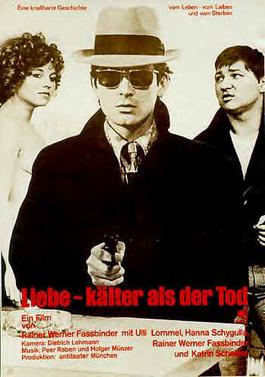
Love is Colder Than Death is a 1969 West German black-and-white film directed by Rainer Werner Fassbinder, his first feature film. In the original theater presentation in Berlin the title was first Kälter als der Tod; at the beginning of film production, it was Liebe – kälter als der Tod as on some film posters. The cinematographer Dietrich Lohmann and the cast as an ensemble won an award at the German Film Awards in 1970.
![<i>World on a Wire</i> 1973 [[West Germany]] TV series or program](https://upload.wikimedia.org/wikipedia/en/a/ad/Welt_Am_Draht_poster.jpg)
World on a Wire is a 1973 West German science fiction television serial, starring Klaus Löwitsch and directed by Rainer Werner Fassbinder. Shot in 16 mm, it was made for West German television and originally aired in 1973 in ARD as a two-part miniseries. It was based on the 1964 novel Simulacron-3 by Daniel F. Galouye. An adaptation of the Fassbinder version was presented as the play World of Wires, directed by Jay Scheib, in 2012.
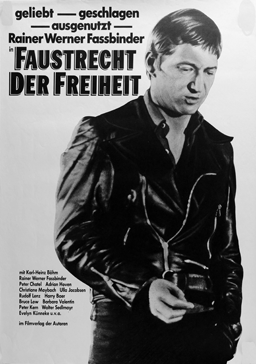
Fox and His Friends is a 1975 West German drama film written and directed by Rainer Werner Fassbinder, starring Fassbinder, Peter Chatel and Karlheinz Böhm. The plot follows the misadventures of a working-class gay man who wins the lottery, then falls in love with the elegant son of an industrialist. His lover tries to mold him into a gilt-edged mirror of upper-class values, and ultimately swindles the easily flattered "Fox" out of his fortune. The film is an incisive look at the relationship between money and emotions. Love is seen as a commodity that can be bought for money and lasts only as long as it is profitable.
Ingrid Caven is a German film actress and singer. She is best known for her roles in several films directed by her husband, Rainer Werner Fassbinder, including Love Is Colder Than Death (1969), Why Does Herr R. Run Amok? (1970), and The American Soldier (1970). She continued to appear in Fassbinder's films after their 1972 divorce until his death in 1982. She has also appeared in Silent Night (1995), 35 Shots of Rum (2009) and Suspiria (2018).

Margit Carstensen was a German theatre and film actress, best known outside Germany for roles in the works of film director Rainer Werner Fassbinder. She appeared in films of directors Christoph Schlingensief and Leander Haußmann and on television in Tatort.
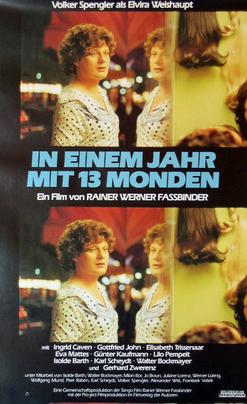
In a Year of 13 Moons is a 1978 West German drama film directed by Rainer Werner Fassbinder and starring Volker Spengler. The film was made in response to the suicide of Fassbinder's lover at the time, Armin Meier. In a "Top 10" list of his own films, Fassbinder placed In a Year of 13 Moons second, after Beware of a Holy Whore.

Irmgard Hermann was a German actress. She worked in film, television, and the stage, appearing in over 160 film and television productions. She was discovered, without formal training, by Rainer Werner Fassbinder who cast her in many of his films. She was awarded the Deutscher Filmpreis for playing Irmgard Epp in Fassbinder's The Merchant of Four Seasons, and again for appearing as Else Gebel, a woman in prison with Sophie Scholl, in Percy Adlon's Fünf letzte Tage.

Günther Kaufmann was a German film actor best known for his association with director Rainer Werner Fassbinder. Fassbinder directed Kaufmann in a total of 14 films, casting him in leading and minor roles. Kaufmann was also romantically involved with the director for a time.

The Merchant of Four Seasons is a 1972 West German film written and directed by Rainer Werner Fassbinder, starring Hans Hirschmüller and Irm Hermann. The plot follows the life of a fruit-peddler, living in 1950s Munich, who is driven over the edge by an uncaring society.

Germany in Autumn is a 1978 West German anthology film about the period of 1977 known as the German Autumn, which was dominated by incidents of terrorism. The film is composed of contributions from different filmmakers, including Rainer Werner Fassbinder, Alexander Kluge, Edgar Reitz, Bernhard Sinkel, Alf Brustellin, Hans Peter Cloos, Katja Rupé, Peter Schubert and Volker Schlöndorff. It was entered into the 28th Berlin International Film Festival, where it won a Special Recognition award.
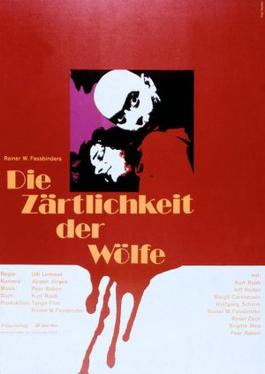
The Tenderness of Wolves is a 1973 West German crime drama film directed by Ulli Lommel. The story is based on the crimes of German serial killer and cannibal Fritz Haarmann. It was written by Kurt Raab, who also stars in the film, and produced by Rainer Werner Fassbinder. It was entered into the 23rd Berlin International Film Festival.
Harry Baer is a German actor, producer and author, best known for his work with director Rainer Werner Fassbinder. He has also been credited as Harry Bär.
![<i>Beware of a Holy Whore</i> 1971 [[West Germany]] film](https://upload.wikimedia.org/wikipedia/en/6/6f/Beware_of_a_Holy_Whore.jpg)
Beware of a Holy Whore is a 1971 West German drama film written and directed by Rainer Werner Fassbinder that features Lou Castel, Eddie Constantine, Hanna Schygulla and Fassbinder himself. Fassbinder considered this to be his favorite of his own films.

Gods of the Plague is a 1970 West German black-and-white drama film directed by Rainer Werner Fassbinder.
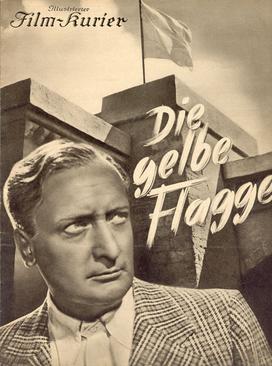
The Yellow Flag is a 1937 German drama film directed by Gerhard Lamprecht and starring Hans Albers, Olga Chekhova and Dorothea Wieck. It was shot at the Babelsberg Studios in Berlin. The film's sets were designed by the art director Ludwig Reiber. Location filming took place in Yugoslavia.





![<i>World on a Wire</i> 1973 [[West Germany]] TV series or program](https://upload.wikimedia.org/wikipedia/en/a/ad/Welt_Am_Draht_poster.jpg)








![<i>Beware of a Holy Whore</i> 1971 [[West Germany]] film](https://upload.wikimedia.org/wikipedia/en/6/6f/Beware_of_a_Holy_Whore.jpg)

